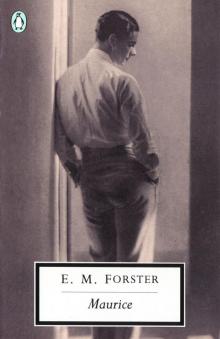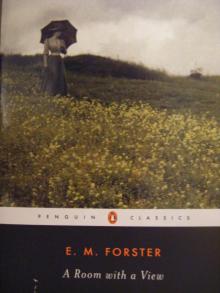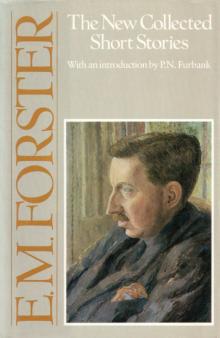- Home
- E. M. Forster
Works of E M Forster Page 46
Works of E M Forster Read online
Page 46
“Am I to conclude,” said Miss Bartlett, “that he is a Socialist?”
Mr. Beebe accepted the convenient word, not without a slight twitching of the lips.
“And presumably he has brought up his son to be a Socialist, too?”
“I hardly know George, for he hasn’t learnt to talk yet. He seems a nice creature, and I think he has brains. Of course, he has all his father’s mannerisms, and it is quite possible that he, too, may be a Socialist.”
“Oh, you relieve me,” said Miss Bartlett. “So you think I ought to have accepted their offer? You feel I have been narrow-minded and suspicious?”
“Not at all,” he answered; “I never suggested that.”
“But ought I not to apologize, at all events, for my apparent rudeness?”
He replied, with some irritation, that it would be quite unnecessary, and got up from his seat to go to the smoking-room.
“Was I a bore?” said Miss Bartlett, as soon as he had disappeared. “Why didn’t you talk, Lucy? He prefers young people, I’m sure. I do hope I haven’t monopolized him. I hoped you would have him all the evening, as well as all dinner-time.”
“He is nice,” exclaimed Lucy. “Just what I remember. He seems to see good in every one. No one would take him for a clergyman.”
“My dear Lucia— “
“Well, you know what I mean. And you know how clergymen generally laugh; Mr. Beebe laughs just like an ordinary man.”
“Funny girl! How you do remind me of your mother. I wonder if she will approve of Mr. Beebe.”
“I’m sure she will; and so will Freddy.”
“I think every one at Windy Corner will approve; it is the fashionable world. I am used to Tunbridge Wells, where we are all hopelessly behind the times.”
“Yes,” said Lucy despondently.
There was a haze of disapproval in the air, but whether the disapproval was of herself, or of Mr. Beebe, or of the fashionable world at Windy Corner, or of the narrow world at Tunbridge Wells, she could not determine. She tried to locate it, but as usual she blundered. Miss Bartlett sedulously denied disapproving of any one, and added “I am afraid you are finding me a very depressing companion.”
And the girl again thought: “I must have been selfish or unkind; I must be more careful. It is so dreadful for Charlotte, being poor.”
Fortunately one of the little old ladies, who for some time had been smiling very benignly, now approached and asked if she might be allowed to sit where Mr. Beebe had sat. Permission granted, she began to chatter gently about Italy, the plunge it had been to come there, the gratifying success of the plunge, the improvement in her sister’s health, the necessity of closing the bed-room windows at night, and of thoroughly emptying the water-bottles in the morning. She handled her subjects agreeably, and they were, perhaps, more worthy of attention than the high discourse upon Guelfs and Ghibellines which was proceeding tempestuously at the other end of the room. It was a real catastrophe, not a mere episode, that evening of hers at Venice, when she had found in her bedroom something that is one worse than a flea, though one better than something else.
“But here you are as safe as in England. Signora Bertolini is so English.”
“Yet our rooms smell,” said poor Lucy. “We dread going to bed.”
“Ah, then you look into the court.” She sighed. “If only Mr. Emerson was more tactful! We were so sorry for you at dinner.”
“I think he was meaning to be kind.”
“Undoubtedly he was,” said Miss Bartlett.
“Mr. Beebe has just been scolding me for my suspicious nature. Of course, I was holding back on my cousin’s account.”
“Of course,” said the little old lady; and they murmured that one could not be too careful with a young girl.
Lucy tried to look demure, but could not help feeling a great fool. No one was careful with her at home; or, at all events, she had not noticed it.
“About old Mr. Emerson — I hardly know. No, he is not tactful; yet, have you ever noticed that there are people who do things which are most indelicate, and yet at the same time — beautiful?”
“Beautiful?” said Miss Bartlett, puzzled at the word. “Are not beauty and delicacy the same?”
“So one would have thought,” said the other helplessly. “But things are so difficult, I sometimes think.”
She proceeded no further into things, for Mr. Beebe reappeared, looking extremely pleasant.
“Miss Bartlett,” he cried, “it’s all right about the rooms. I’m so glad. Mr. Emerson was talking about it in the smoking-room, and knowing what I did, I encouraged him to make the offer again. He has let me come and ask you. He would be so pleased.”
“Oh, Charlotte,” cried Lucy to her cousin, “we must have the rooms now. The old man is just as nice and kind as he can be.”
Miss Bartlett was silent.
“I fear,” said Mr. Beebe, after a pause, “that I have been officious. I must apologize for my interference.”
Gravely displeased, he turned to go. Not till then did Miss Bartlett reply: “My own wishes, dearest Lucy, are unimportant in comparison with yours. It would be hard indeed if I stopped you doing as you liked at Florence, when I am only here through your kindness. If you wish me to turn these gentlemen out of their rooms, I will do it. Would you then, Mr. Beebe, kindly tell Mr. Emerson that I accept his kind offer, and then conduct him to me, in order that I may thank him personally?”
She raised her voice as she spoke; it was heard all over the drawing-room, and silenced the Guelfs and the Ghibellines. The clergyman, inwardly cursing the female sex, bowed, and departed with her message.
“Remember, Lucy, I alone am implicated in this. I do not wish the acceptance to come from you. Grant me that, at all events.”
Mr. Beebe was back, saying rather nervously:
“Mr. Emerson is engaged, but here is his son instead.”
The young man gazed down on the three ladies, who felt seated on the floor, so low were their chairs.
“My father,” he said, “is in his bath, so you cannot thank him personally. But any message given by you to me will be given by me to him as soon as he comes out.”
Miss Bartlett was unequal to the bath. All her barbed civilities came forth wrong end first. Young Mr. Emerson scored a notable triumph to the delight of Mr. Beebe and to the secret delight of Lucy.
“Poor young man!” said Miss Bartlett, as soon as he had gone.
“How angry he is with his father about the rooms! It is all he can do to keep polite.”
“In half an hour or so your rooms will be ready,” said Mr. Beebe. Then looking rather thoughtfully at the two cousins, he retired to his own rooms, to write up his philosophic diary.
“Oh, dear!” breathed the little old lady, and shuddered as if all the winds of heaven had entered the apartment. “Gentlemen sometimes do not realize— “ Her voice faded away, but Miss Bartlett seemed to understand and a conversation developed, in which gentlemen who did not thoroughly realize played a principal part. Lucy, not realizing either, was reduced to literature. Taking up Baedeker’s Handbook to Northern Italy, she committed to memory the most important dates of Florentine History. For she was determined to enjoy herself on the morrow. Thus the half-hour crept profitably away, and at last Miss Bartlett rose with a sigh, and said:
“I think one might venture now. No, Lucy, do not stir. I will superintend the move.”
“How you do do everything,” said Lucy.
“Naturally, dear. It is my affair.”
“But I would like to help you.”
“No, dear.”
Charlotte’s energy! And her unselfishness! She had been thus all her life, but really, on this Italian tour, she was surpassing herself. So Lucy felt, or strove to feel. And yet — there was a rebellious spirit in her which wondered whether the acceptance might not have been less delicate and more beautiful. At all events, she entered her own room without any feeling of joy.
“I want to
explain,” said Miss Bartlett, “why it is that I have taken the largest room. Naturally, of course, I should have given it to you; but I happen to know that it belongs to the young man, and I was sure your mother would not like it.”
Lucy was bewildered.
“If you are to accept a favour it is more suitable you should be under an obligation to his father than to him. I am a woman of the world, in my small way, and I know where things lead to. However, Mr. Beebe is a guarantee of a sort that they will not presume on this.”
“Mother wouldn’t mind I’m sure,” said Lucy, but again had the sense of larger and unsuspected issues.
Miss Bartlett only sighed, and enveloped her in a protecting embrace as she wished her good-night. It gave Lucy the sensation of a fog, and when she reached her own room she opened the window and breathed the clean night air, thinking of the kind old man who had enabled her to see the lights dancing in the Arno and the cypresses of San Miniato, and the foot-hills of the Apennines, black against the rising moon.
Miss Bartlett, in her room, fastened the window-shutters and locked the door, and then made a tour of the apartment to see where the cupboards led, and whether there were any oubliettes or secret entrances. It was then that she saw, pinned up over the washstand, a sheet of paper on which was scrawled an enormous note of interrogation. Nothing more.
“What does it mean?” she thought, and she examined it carefully by the light of a candle. Meaningless at first, it gradually became menacing, obnoxious, portentous with evil. She was seized with an impulse to destroy it, but fortunately remembered that she had no right to do so, since it must be the property of young Mr. Emerson. So she unpinned it carefully, and put it between two pieces of blotting-paper to keep it clean for him. Then she completed her inspection of the room, sighed heavily according to her habit, and went to bed.
Chapter II: In Santa Croce with No Baedeker
It was pleasant to wake up in Florence, to open the eyes upon a bright bare room, with a floor of red tiles which look clean though they are not; with a painted ceiling whereon pink griffins and blue amorini sport in a forest of yellow violins and bassoons. It was pleasant, too, to fling wide the windows, pinching the fingers in unfamiliar fastenings, to lean out into sunshine with beautiful hills and trees and marble churches opposite, and close below, the Arno, gurgling against the embankment of the road.
Over the river men were at work with spades and sieves on the sandy foreshore, and on the river was a boat, also diligently employed for some mysterious end. An electric tram came rushing underneath the window. No one was inside it, except one tourist; but its platforms were overflowing with Italians, who preferred to stand. Children tried to hang on behind, and the conductor, with no malice, spat in their faces to make them let go. Then soldiers appeared — good-looking, undersized men — wearing each a knapsack covered with mangy fur, and a great-coat which had been cut for some larger soldier. Beside them walked officers, looking foolish and fierce, and before them went little boys, turning somersaults in time with the band. The tramcar became entangled in their ranks, and moved on painfully, like a caterpillar in a swarm of ants. One of the little boys fell down, and some white bullocks came out of an archway. Indeed, if it had not been for the good advice of an old man who was selling button-hooks, the road might never have got clear.
Over such trivialities as these many a valuable hour may slip away, and the traveller who has gone to Italy to study the tactile values of Giotto, or the corruption of the Papacy, may return remembering nothing but the blue sky and the men and women who live under it. So it was as well that Miss Bartlett should tap and come in, and having commented on Lucy’s leaving the door unlocked, and on her leaning out of the window before she was fully dressed, should urge her to hasten herself, or the best of the day would be gone. By the time Lucy was ready her cousin had done her breakfast, and was listening to the clever lady among the crumbs.
A conversation then ensued, on not unfamiliar lines. Miss Bartlett was, after all, a wee bit tired, and thought they had better spend the morning settling in; unless Lucy would at all like to go out? Lucy would rather like to go out, as it was her first day in Florence, but, of course, she could go alone. Miss Bartlett could not allow this. Of course she would accompany Lucy everywhere. Oh, certainly not; Lucy would stop with her cousin. Oh, no! that would never do. Oh, yes!
At this point the clever lady broke in.
“If it is Mrs. Grundy who is troubling you, I do assure you that you can neglect the good person. Being English, Miss Honeychurch will be perfectly safe. Italians understand. A dear friend of mine, Contessa Baroncelli, has two daughters, and when she cannot send a maid to school with them, she lets them go in sailor-hats instead. Every one takes them for English, you see, especially if their hair is strained tightly behind.”
Miss Bartlett was unconvinced by the safety of Contessa Baroncelli’s daughters. She was determined to take Lucy herself, her head not being so very bad. The clever lady then said that she was going to spend a long morning in Santa Croce, and if Lucy would come too, she would be delighted.
“I will take you by a dear dirty back way, Miss Honeychurch, and if you bring me luck, we shall have an adventure.”
Lucy said that this was most kind, and at once opened the Baedeker, to see where Santa Croce was.
“Tut, tut! Miss Lucy! I hope we shall soon emancipate you from Baedeker. He does but touch the surface of things. As to the true Italy — he does not even dream of it. The true Italy is only to be found by patient observation.”
This sounded very interesting, and Lucy hurried over her breakfast, and started with her new friend in high spirits. Italy was coming at last. The Cockney Signora and her works had vanished like a bad dream.
Miss Lavish — for that was the clever lady’s name — turned to the right along the sunny Lung’ Arno. How delightfully warm! But a wind down the side streets cut like a knife, didn’t it? Ponte alle Grazie — particularly interesting, mentioned by Dante. San Miniato — beautiful as well as interesting; the crucifix that kissed a murderer — Miss Honeychurch would remember the story. The men on the river were fishing. (Untrue; but then, so is most information.) Then Miss Lavish darted under the archway of the white bullocks, and she stopped, and she cried:
“A smell! a true Florentine smell! Every city, let me teach you, has its own smell.”
“Is it a very nice smell?” said Lucy, who had inherited from her mother a distaste to dirt.
“One doesn’t come to Italy for niceness,” was the retort; “one comes for life. Buon giorno! Buon giorno!” bowing right and left. “Look at that adorable wine-cart! How the driver stares at us, dear, simple soul!”
So Miss Lavish proceeded through the streets of the city of Florence, short, fidgety, and playful as a kitten, though without a kitten’s grace. It was a treat for the girl to be with any one so clever and so cheerful; and a blue military cloak, such as an Italian officer wears, only increased the sense of festivity.
“Buon giorno! Take the word of an old woman, Miss Lucy: you will never repent of a little civility to your inferiors. That is the true democracy. Though I am a real Radical as well. There, now you’re shocked.”
“Indeed, I’m not!” exclaimed Lucy. “We are Radicals, too, out and out. My father always voted for Mr. Gladstone, until he was so dreadful about Ireland.”
“I see, I see. And now you have gone over to the enemy.”
“Oh, please — ! If my father was alive, I am sure he would vote Radical again now that Ireland is all right. And as it is, the glass over our front door was broken last election, and Freddy is sure it was the Tories; but mother says nonsense, a tramp.”
“Shameful! A manufacturing district, I suppose?”
“No — in the Surrey hills. About five miles from Dorking, looking over the Weald.”
Miss Lavish seemed interested, and slackened her trot.
“What a delightful part; I know it so well. It is full of the very nicest people. Do you k
now Sir Harry Otway — a Radical if ever there was?”
“Very well indeed.”
“And old Mrs. Butterworth the philanthropist?” “Why, she rents a field of us! How funny!”
Miss Lavish looked at the narrow ribbon of sky, and murmured: “Oh, you have property in Surrey?”
“Hardly any,” said Lucy, fearful of being thought a snob. “Only thirty acres — just the garden, all downhill, and some fields.”
Miss Lavish was not disgusted, and said it was just the size of her aunt’s Suffolk estate. Italy receded. They tried to remember the last name of Lady Louisa some one, who had taken a house near Summer Street the other year, but she had not liked it, which was odd of her. And just as Miss Lavish had got the name, she broke off and exclaimed:
“Bless us! Bless us and save us! We’ve lost the way.”
Certainly they had seemed a long time in reaching Santa Croce, the tower of which had been plainly visible from the landing window. But Miss Lavish had said so much about knowing her Florence by heart, that Lucy had followed her with no misgivings.
“Lost! lost! My dear Miss Lucy, during our political diatribes we have taken a wrong turning. How those horrid Conservatives would jeer at us! What are we to do? Two lone females in an unknown town. Now, this is what I call an adventure.”
Lucy, who wanted to see Santa Croce, suggested, as a possible solution, that they should ask the way there.
“Oh, but that is the word of a craven! And no, you are not, not, NOT to look at your Baedeker. Give it to me; I shan’t let you carry it. We will simply drift.”
Accordingly they drifted through a series of those grey-brown streets, neither commodious nor picturesque, in which the eastern quarter of the city abounds. Lucy soon lost interest in the discontent of Lady Louisa, and became discontented herself. For one ravishing moment Italy appeared. She stood in the Square of the Annunziata and saw in the living terra-cotta those divine babies whom no cheap reproduction can ever stale. There they stood, with their shining limbs bursting from the garments of charity, and their strong white arms extended against circlets of heaven. Lucy thought she had never seen anything more beautiful; but Miss Lavish, with a shriek of dismay, dragged her forward, declaring that they were out of their path now by at least a mile.

 The Celestial Omnibus and Other Stories
The Celestial Omnibus and Other Stories Maurice
Maurice The Longest Journey
The Longest Journey Howards End
Howards End A Room with a View
A Room with a View The New Collected Short Stories
The New Collected Short Stories A Passage to India
A Passage to India Where Angels Fear to Tread
Where Angels Fear to Tread Works of E M Forster
Works of E M Forster Selected Stories
Selected Stories The Machine Stops
The Machine Stops Aspects of the Novel
Aspects of the Novel